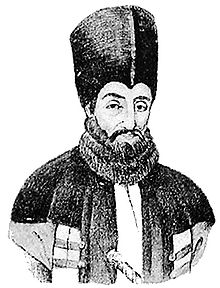Scarlat Callimachi (hospodar)

Scarlat Callimachi (Constantinople 1773 - December 12, 1821) was Grand Dragoman of the Sublime Porte 1801-1806, Prince of Moldavia between August 24 1806 - October 26 1806, August 4 1807 - June 13 1810, September 17 1812 - June 1819 and of Prince of Wallachia between February 1821 - June 1821.
A member of the Callimachi family, he was the son of Alexandru Callimachi and Ruxandra Ghica, and married Smaragda Mavrogheni[1]. In 1810, during the Russo-Turkish war, he was imprisoned by the Russians, and taken to Kharkiv. He regained the Moldovan throne in 1812. Scarlat Callimachi adopted new laws and cut taxes for the boyars. He took measures against the plague, maintained upkeep of wooden bridges, supported Gheorghe Asachi's Romanian-language movement, and introduced potatoes to Moldavia.
In 1819 Scarlat Callimachi was taken to Constantinopole to be executed after being suspected of siding with the Russians. The sentence was cancelled after he turned mad.
The Greek War of Independence broke out in 1821, and Callimachi died poisoned later that year, under suspicion of being pro Greek. Although having only been Prince de jure a few months in 1821, he is considered to be the last Phanariote ruler of Wallachia. [2]
References
- ^ http://www.christopherlong.co.uk/gen/callimachigen/fg11/fg11_423.html
- ^ Neagu Djuvara, Între Orient şi Occident. Ţările române la începutul epocii moderne, Humanitas, Bucharest, 1995
